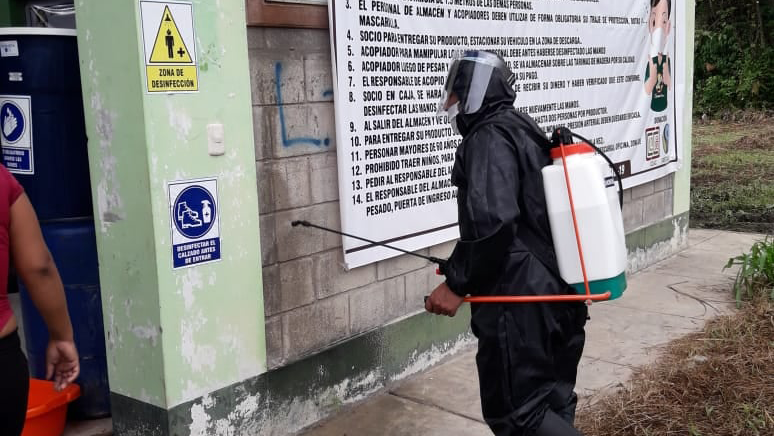Peruvian cocoa producers benefit from Fairtrade coronavirus fund

A Fairtrade fund established by the Latin American and Caribbean Network of Fair Trade Small Producers and Workers (Clac) is reportedly proving effective at assisting a number of cocoa producing operations, including in Peru.
The charity has reported in that in the country’s collection centre of the Cooperativa Agraria Ecológica Cacaotera Valle Río Ene (Coopavre), located in the Junin region, each producer who brings cocoa wears a mask on a mandatory basis, washes their hands, disinfects their shoes, and has their temperature measured before delivering their cocoa, which would not have been possible without financial support being in place.
“The help they have given us has been very useful to us, we have bought bleach, alcohol, soap, masks, protective suits, infrared thermometers, boots, water containers, disinfectant backpack sprayers, signage, and a banner with the biosafety protocols for the work in the central storage warehouse. We are also distributing to each member a sanitary kit with all those materials. This aid has helped us a lot to prevent the spread of coronavirus,” stated Marco Antonio Dominguez, president of Coopavre.
Like Coopavre, 117 other organisations have had their requests for the Relief Fund approved under the scheme that was established in April.
In one district in Satipo province, each of the 212 associates and workers of Coopavre has received a kit containing alcohol, masks, bleach, soap, and a face covering. In addition, the organisation purchased protective suits for workers, containers to install handwashing stations, supplies to disinfect shoes, and disinfectant backpack sprayers to sterilise the office and warehouse area.
As Fairtrade notes, although the number of people with coronavirus in Peru is one of the highest in Latin America, there are still few cases in the communities where the co-op operates. This is in huge part thanks to the fact that the members have organised to promote prevention measures.
‘We as people have already tried to organise ourselves. Each community in that area has taken very strict measures and that is why there were no cases,’ said Dominguez.
The organisation has also donated health kits to the Selva de Oro medical centre. In addition, the organic cocoa producer co-op is also disseminating information about the preventive measures over the phone or through visits to producers, all while respecting social distancing. Coopavre received $2,000 from CLAC´s Relief Fund to implement the biosafety protocol, which is desperately needed in the current cocoa harvest months. Besides the measures in the collection centre, the co-op has organised transportation to collect the product at allotments to prevent associates from exposing themselves to the virus.
“Thank you for the support you have given us in our country. That is helping us and if there is more support, it will be welcomed. That way we can protect ourselves until the end of this pandemic and thus our partners are well protected. Our partners are grateful for the support that is being provided,” Dominguez concluded.
To date, 45 other applications have been approved for the Fund to help co-ops implement biosafety protocols and take measures to protect their associates and workers from coronavirus.
Clac´s Relief Fund is still open and the organisations can request financing to implement biosecurity protocols, defray increased production costs, and also for medical, hospital, or funeral expenses related to the coronavirus pandemic. There is also a line to subsidise the Fairtrade certification payment.
